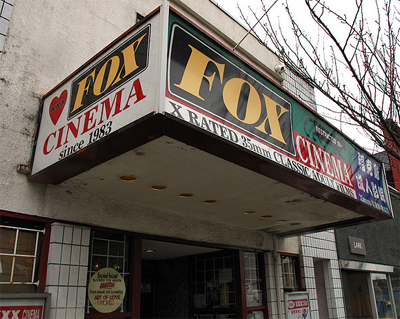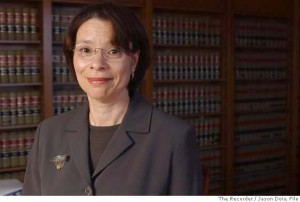
The Fox Cinema in Vancouver shows adult movies all day long.
Proposed Amendments to the Zoning Code would ban recreation and entertainment from the industrial area – but would allow “adult businesses” to continue.
Ban likely to be unconstitutional and won’t help with the Faith Fellowship lawsuit.
If Meyers Nave, the law firm that represents the City of San Leandro, gets its way, strip bars and peep shows could flourish in the industrial area of San Leandro. But theaters, cinemas and recreational venues would not be welcomed. Shakespeare would be OK, but only if all the actors were nude and got frisky with one another.
At its next meeting, the City Council will again consider banning entertainment and recreational uses from the industrial area of town. This short-sighted plan was concocted by Meyers Nave in response to the Faith Fellowship litigation. Currently, the Zoning code allows entertainment and recreational uses of properties zoned industrial, but not assembly or religious uses. The 9th Circuit recently ruled that such unequal treatment violates RLUIPA.
The City has potentially two ways in which to amend the code to comply with federal law. It can either allow religious/assembly uses in the industrial area or it can ban entertainment and recreational uses. The former approach can contribute to the development of the industrial area, it can bring new people to San Leandro – who will then be likely to shop and dine in this city -, and it can create competition for the purchase of properties, bringing up property values.
The City Council, however, has chosen to focus on the second option: banning entertainment and recreational uses in the industrial area. I have written before as to why this is a bad idea: the high-tech companies we want to attract realize the importance of combining entertainment and recreation with work – it makes for happier, more productive employees. Indeed, this is a point that David Johnson, CEO of the San Leandro Chamber of Commerce, has repeatedly made to the City. Johnson spent a decade working on economic development in Oakland and knows first hand how companies seek to move to cities that don’t make them jump through hoops. When presented with these facts, the Planning Commission voted twice to reject the entertainment and recreation bans.
The City’s attorneys, however, are adamant about further restricting uses in the industrial area, and they hold a lot of sway with the City Council. At the last Council meeting, Deborah Fox admitted that the only reason to amend the code was to facilitate the city’s legal strategy on the Faith Fellowship case. She stated that the district judge will consider the Zoning code as it stands when trial begins, and thus there is a hurry to make these changes soon.
I am unable, however, to figure out what advantage Fox thinks the City will gain by making these changes. Leaving the issue of adult entertainment aside, the proposed changes in the Zoning code would likely prevent the Church from obtaining a declaratory judgment to the effect that the City’s Zoning code violates RLUIPA. The district court, however, would still have to decide whether the City violated the equal terms clause of RLUIPA back when it stopped FF from moving into the property they’d bought, and if so, award monetary damages to the Church. The only “advantage” I can see for the City is in being able to stop Faith Fellowship from acquiring another property in the industrial section and putting a church there. This may seem very petty, but the City Attorney may have been able to sell this approach to the Council as some sort of “victory”.
In any case, their strategy is very unlikely to work. The Zoning code amendments will bar entertainment and recreational uses from the industrial area, but will continue to allow adult businesses, including adult entertainment businesses, to operate. The City doesn’t have much of a choice about this, it must allow such businesses to locate somewhere in town and the industrial area seemed the most unobjectionable one when the code was last amended. But this means that in order to ban adult entertainment in the industrial area, the City must first allow it elsewhere within City limits. That would open a whole new can of worms that the City, of course, wants to avoid.
But if the Zoning code isn’t changed to disallow adult entertainment in the industrial area, the City is in exactly the same position that it is today: treating churches differently than entertainment venues, and that’s what the 9th circuit has said they cannot do.
As if this wasn’t enough, it seems quite likely that the City doesn’t have the right to ban entertainment from the industrial area in the first place. Entertainment is considered a form speech and therefore protected by the first amendment. In Schad v. Mount Ephraim, the US Supreme Court ruled that any ban on entertainment must be “narrowly drawn and must further a sufficiently substantial government interest”. Schad concerned a city ordinance which prohibited live entertainment in the commercial district, while allowing businesses such as motels, lumber stores, restaurants and office buildings. In that case, the Court could not find any “substantial government interest” accomplished by the ban. But a Court looking at an entertainment ban in San Leandro would not even have to look that far – Deborah Fox is on record saying that the only reason for the ban was to gain an advantage in their litigation against Faith Fellowship. No Court in the land will consider that to be a legitimate, much less a “substantial,” reason for restricting speech.
We are left with the question, then, of what the City’s attorneys reasons for pushing these changes are. As I’m not a mind reader, I can only speculate:
– Incompetence. Meyers Nave handled this case badly from the start, neglecting to tell the Council about the risks and potential costs of stopping FF from building their church. Deborah Fox, in particular, did a horrendous job of arguing the case before the 9th circuit; she seemed surprised by the questions posed by the judges and had no answers. Her whole handling of the situation since does not inspire confidence in her legal acumen. So it may simply be that Meyers Nave didn’t look carefully enough at the Zoning code or the law to actually understand the issues at play.
– Presumed incompetence. Meyers Nave tried very hard to have the amendments to the Zoning code be made as quietly as possible. City staff made up reasons for why these changes were needed, they hid the actual nature of the changes, and the City Council was only informed about them in closed session – very likely in violation of the Brown Act. They probably believed that they could sneak them by without Faith Fellowship’s attorneys noticing. I wouldn’t be surprised if Meyers Nave is also hoping that FF’s lawyers won’t re-read the Zoning code and notice that the “adult-oriented businesses” clause will remain in place.
– Profit. The City pays Meyers Nave a very generous amount for general City Attorney services, but they must pay them by the hour for any litigation services. This means that the more bad advice Meyers Nave gives the city, the more likely the city is to get sued, and the more money Meyers Nave will make in attorney’s fees. Smart cities avoid this clear conflict of interest by having the City Attorney be an employee, and thus not personally benefit from any litigation.
So what now? We can hope that the City Council will see reason, and will realize that what’s best for Meyers Nave is not what’s best for the City. We can ask that they do what they were elected to do and include the citizens in any and all decisions that will have such a great impact in the community. And we can urge them to let get independent legal advise on this matter – from a firm not hired or recommended by Meyers Nave.
Unfortunately, I’m not too hopeful.




 It’s an Acknowledgement that they Violated Faith Fellowship’s Constitutional Rights but… is it good Public Policy?
It’s an Acknowledgement that they Violated Faith Fellowship’s Constitutional Rights but… is it good Public Policy?